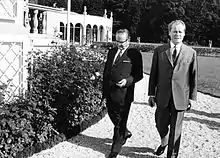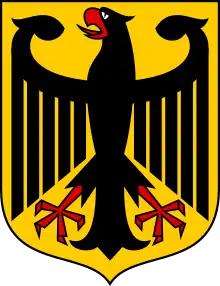Germany–Yugoslavia relations
Germany–Yugoslavia relations were post-World War I historical foreign relations between Germany (Weimar Republic, Nazi Germany, Allied-occupied Germany, West Germany and post-reunification Germany till 1992) and now split-up Yugoslavia (both Kingdom of Yugoslavia or Socialist Federal Republic of Yugoslavia). In addition, Yugoslavia maintained relations with East Germany.
Germany |
Yugoslavia |
|---|---|
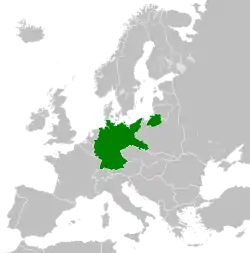
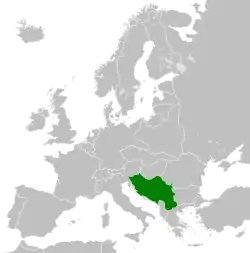
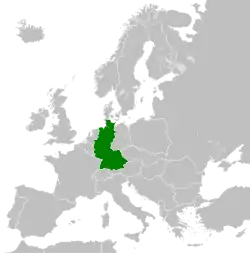
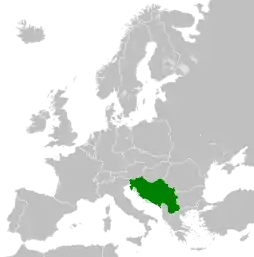
History
Interwar period
Over the centuries German-speaking parts of Europe played important political, cultural, scientific and economic gravitational role for South Slavic communities. Close cultural and economic links remained throughout the XX century. On 25 March 1941 Yugoslavia signed the Tripartite Pact which just two days later, on 27 March 1941, provoked the British encouraged Yugoslav coup d'état. The coup in turn provoked the Axis Invasion of Yugoslavia.
World War II
In the period of World War II in Yugoslavia Nazi Germany with its allies and client regimes invaded and divided Yugoslavia. Direct Nazi and client regimes crimes included Holocaust in Croatia and Serbia, Genocide of Serbs, Chetnik war crimes and other. The communist-led republican Yugoslav Partisans evolved into Europe's most effective anti-Axis resistance movement. During the flight and expulsion of Germans in the immediate post-war years majority of Germans of Yugoslavia left the country.
Cold War
After the war two countries initiated significant economic cooperation. Yugoslav decision to recognize East Germany in 1957 (as a part of its efforts to improve relations with the Soviet Union after the 1948 Tito–Stalin split) pushed West Germany to apply the Hallstein Doctrine for the first time in history, limiting relations almost exclusively to the economics field for the next eleven years (until 1968) until the initiation of the Ostpolitik.[1][2] Contrary to countries within the Eastern Bloc Yugoslav authorities permitted free international travel of its citizens while large number of Germans spent their summers at the Adriatic Sea, both of which furthered people to people exchanges. In 1968 Yugoslavia and West Germany signed an agreement on Yugoslav Gastarbeiter workforce, at the time when there was already over 300 000 Yugoslav workers in West Germany.[3]
German reunification and Yugoslav crisis
At the earliest stage of the Yugoslav crisis German political elites initially supported preservation of Yugoslavia with only CSU conditionally supporting independence movements.[4] As late as 19 June 1991 all political parties in Bundestag favored confederal reorganization of Yugoslavia but this attitude siftly changed after the declaration of independence by the Socialist Republic of Croatia and Slovenia and actions of the Yugoslav People's Army from 25 June 1991 onwards.[4] From the end of June 1995 German Chancellor Helmut Kohl strongly supported the right of self-determination for the Croatia and Slovenia which led to lack of unity among the European Economic Community as the French President François Mitterrand argued against immediate cutoff of aid to Yugoslavia, while Spain, Italy and United Kingdom insisted on the territorial integrity of Yugoslavia.[5] German readiness to recognize Croatia and Slovenia unilaterally without other EEC member states pushed the entire community to jointly follow the course on 15 January 1992.[6]
See also
References
- Kosanović, Milan (2009). "Brandt and Tito: Between Ostpolitik and Nonalignment". In Fink, Carole; Schaefer, Bernd (eds.). Ostpolitik, 1969-1974: European and Global Responses. New York: German Historical Institute Washington DC & Cambridge University Press. pp. 232–243. ISBN 978-0-521-89970-3.
- Maricic, Alan (2019). “Lucky that East Germany also exists”: Yugoslavia between the Federal Republic of Germany and the German Democratic Republic (1955-1968) (Doctor of Philosophy). University of Waterloo. Retrieved 11 August 2020.
- Rujević, Nemanja. "Jugoslavenski gastarbajteri: „Kako ću raditi baš za Švabu?!"". Deutsche Welle. Retrieved 3 February 2021.
- Zipfel, Tomáš (1996). "Germany and the recognition of the sovereignty of Slovenia and Croatia". Perspectives (6/7): 137–146. Retrieved 2 February 2021.
- Riding, Alan. "Conflict in Yugoslavia; EUROPEANS SEND HIGH--LEVEL TEAM". The New York Times. Retrieved 2 February 2021.
- Kinzer, Stephen. "Europe, Backing Germans, Accepts Yugoslav Breakup". The New York Times. Retrieved 2 February 2021.
